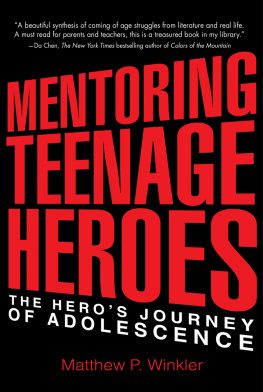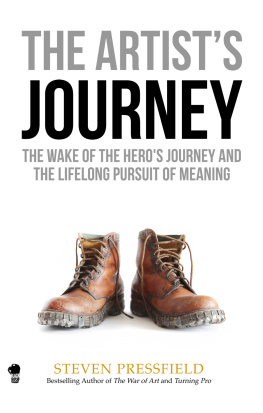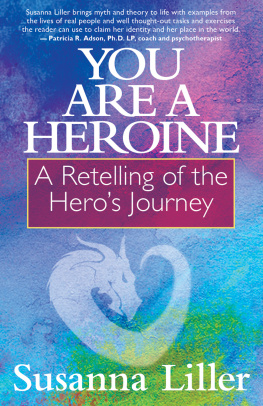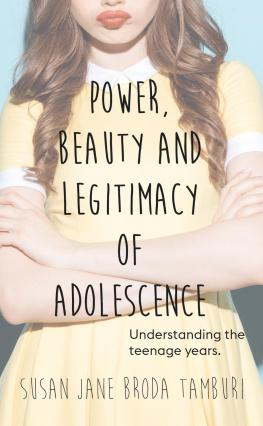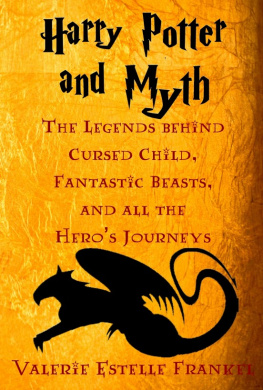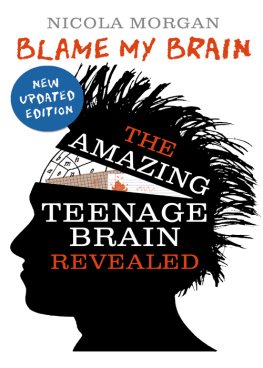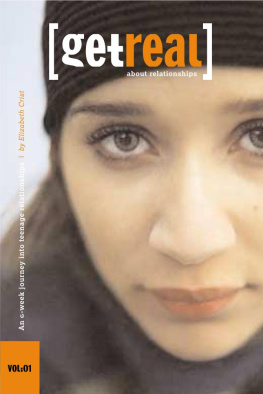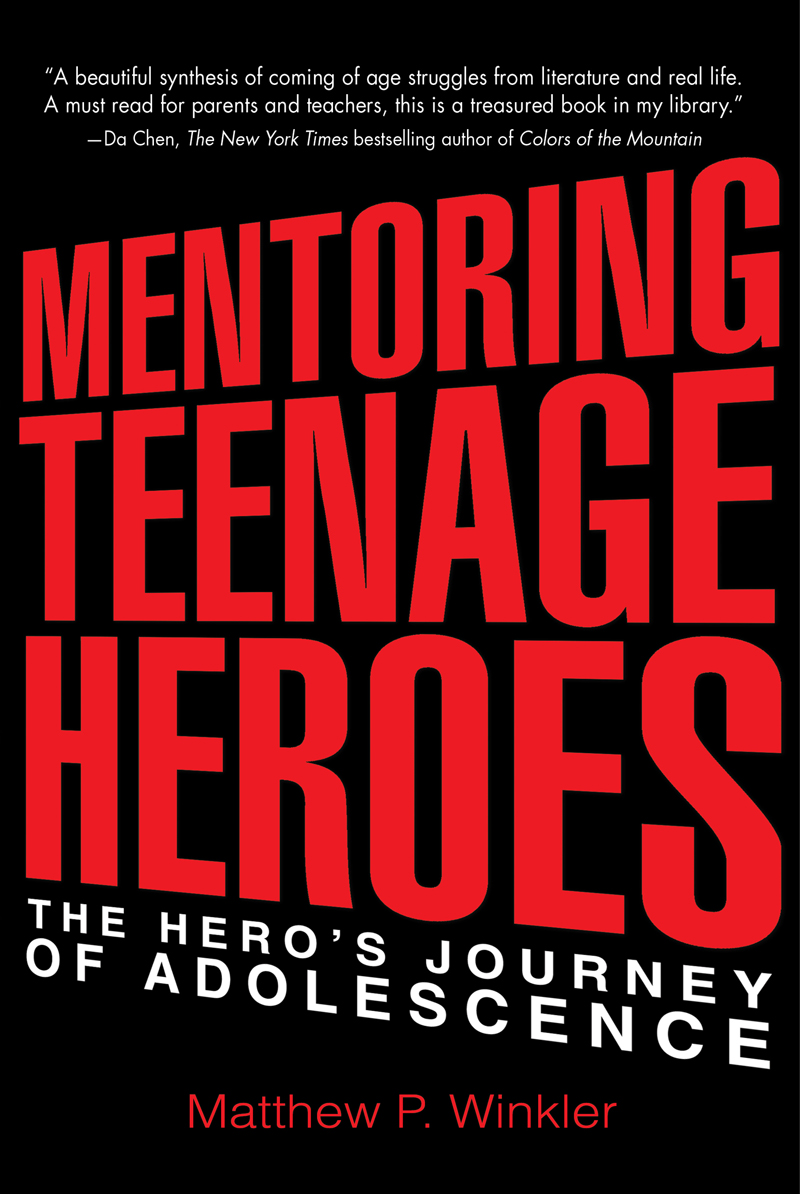Mentoring Teen a ge H eroes
T h e Heros Journey of Adolescence
Mentoring Teenage Heroes educates and inspires adults to look at the journey of adolescents in a new light, one that acknowledges tragedy, triumph, and growth are essential in the developmental process.
Justin Bendall,
School Counselor, The Rectory School
Every parent, coach, and teacher should read Mentoring Teenage Heroes .
Andrew J. Vadnais,
Head of School, South Kent School
Mentoring Teenage Heroes is enticing, informative and exceedingly well written. Anyone involved with the inner life of teens can find here an accesible and invaluable resource to help them interpret whats going on in their lives.
Rev Art Purcaro OSA,
Assistant Vice President for Mission and Ministry, Villanova University
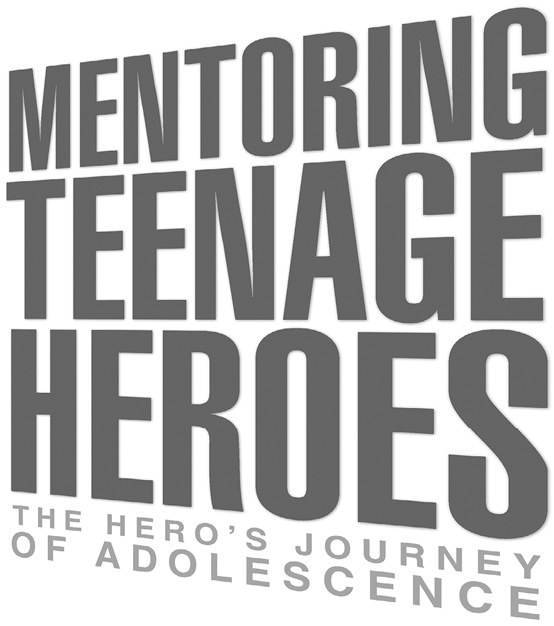
Matthew P. Winkler

Norwalk - Branford, Connecticut
Authors Note
I have relied upon the recollections of those who were present during the events described in this book. There are no composite characters or events in this book, although some nonessential people and events have been omitted. I have changed the names of many of the people in this book and sometimes altered distinguishing details about them in order to protect their privacy.
Back cover illustration TED Conferences LLC, designed by Kirill Yeretsky
Author photo Matthew P. Winkler
All rights reserved. No part of this book may be reproduced in any form or by any electronic or mechanical means, including information storage and retrieval systems, without written permission from the publisher, except by a reviewer who may quote passages in a review.
Library of Congress Cataloging-in-Publication Data available
978-0-9975437-3-5 (paperback Ingram)
978-0-9975437-2-8 (e-book Ingram)
The author and Woodhall Press LLP assume no liability for accidents happening to, or injuries sustained by, readers who engage in the activities described in this book.

Contents
Chapter 1:
Chapter 2:
Chapter 3:
Chapter 4:
Chapter 5:
Chapter 6:
Chapter 7:
Chapter 8:
Chapter 9:
Chapter 10:
Chapter 11:
Chapter 12:
Introduction
W hen you were a teenager, you encountered a storya book or moviethat infected you, got under your skin, branded you with its invisible tattoo. Your parents and teachers didnt understand you, the boy or girl of your dreams didnt notice you, but that story sure had your number. It was so disturbingly familiaran inexplicable feeling of dj vu.
Its a safe bet that the hero of the story was shaken from his or her ordinary life, dropped into a strange world, tested against overwhelming odds and symbolically destroyed, only to be reborn triumphant and finally return home, transformed and larger than life. This recurring cycle can be found in ancient myths of almost every culture, worldwide. James Joyce termed it the monomyth, and comparative mythologist Joseph Campbell called it the heros journey. In his seminal book, The Hero with a Thousand Faces, Campbell argued that every hero is the same hero, merely adapted to the unique context of each culture, and he referenced dozens of examples from around the globe. This universal, mythical structure echoes throughout todays novels, films, and television shows. And its probably what hooked you as a teenager.
You could relate to that story because it was your own story, writ large. Hadnt you been tossed, headfirst, into the choppy seas of adolescence? Werent you struggling to navigate those uncharted waters with nothing but your own wits, a few close friends, and maybe just one mentor who got you? Ironically, every teenager around you was enduring a similar ordeal, undergoing his or her own personal heros journey, following a pattern that has replayed for eonsa rite of passage as old as the myths that metaphorically describe it.
Mentoring Teenage Heroes is written for parents, teachers, coaches, and other ex-adolescents who are now guiding the new generation of teens as they tumble through fresh waves of clarity and confusion, triumph and defeat, love and heartbreak. By reviewing Campbells original scholarship on this subject and tracing its influence on contemporary movies and books, readers will learn to identify this underlying pattern in examples as familiar as Theseus and the Minotaur, Cinderella, the Star Wars saga, the Harry Potter series, and The Hunger Games trilogy. Instead of presenting Percy Jackson and Katniss Everdeen as flavors of the week, Mentoring Teenage Heroes will tie them to the myths they spring from and offer insights into why these modern fictional characters resonate with todays teenagers. Unlike their matinee idols, our kids arent at the center of dystopian or intergalactic conflicts, but they feel like they are.
Mentoring Teenage Heroes relates the true stories of Colin and Cynthia, two compelling young people on very different journeys that reveal the flexibility of the heros journey formula: Colins story spans two decades; Cynthias covers five years. Colin loves his mom, but he is heartsick for his absent father. Cynthia is a gifted athlete, heading off to college on a soccer scholarship, but her illicit, secret life nearly destroys her. These two contrasting narratives propel the reader through twelve chapters and serve as a basis for understanding how the dramatic transition from childhood to adulthood is reflected in ancient myths and modern storytelling. For most adults, daily life is a routine grind. For teenagers, its an epic struggle for identity.
Foreword
J oseph Campbell was a world-renowned expert in comparative mythology and a professor at Sarah Lawrence College for thirty-eight years. He is best known for coining the phrase follow your bliss and for developing the concept of the heros journey, a universal formula that underlies all myths. Campbell published his seminal work, The Hero with a Thousand Faces , in 1949. As its title suggests, the book compares heroic myths from around the world, pointing out the essential elements they share.
In the 1970s a young filmmaker named George Lucas seized upon the familiar plot formula described in Campbells book. He used the heros journey as the framework for his Star Wars series, and he credits Campbell with that inspiration. Books, video games, and television shows are also filled with stories that echo the ancient pattern of a hero on a physical or emotional quest that results in his or her transformation.
This would not surprise Joseph Campbell, who frequently emphasized the universal psychological underpinnings of the heros journey formula. The reason that myths are fundamentally the same in every culture, he argued, is because all human beings share basically the same psychology. We experience every day, year, and period of our lives in similar ways, regardless of race, language, and culture. After more than fifty years of studying the subject, Campbell remained convinced that myths tell us how to live, how to be human, which is why the ancient heros journey paradigm remains relevant in the modern world.
But what is the heros journey, exactly? Think of it as a cycle. Imagine a circular clock with the hour hand sweeping around its face. The first three hours take place in the heros ordinary world, from which the hero departs at three oclock. The hero spends the next six hours in some unfamiliar, special world before returning home at nine oclock. The story culminates in the heros ordinary world during those last three hours.

